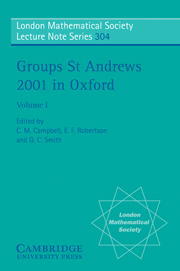Book contents
- Frontmatter
- Contents
- Contents of Volume 2
- Introduction
- Permutability and subnormality in finite groups
- (Pro)-finite and (topologically) locally finite groups with a CC-subgroup
- Table algebras generated by elements of small degrees
- Subgroups which are a union of a given number of conjugacy classes
- Some results on finite factorized groups
- On nilpotent-like Fitting formations
- Locally finite groups with min-p for all primes p
- Quasi-permutation representations of 2-groups of class 2 with cyclic centre
- Groups acting on bordered Klein surfaces with maximal symmetry
- Breaking points in subgroup lattices
- Group actions on graphs, maps and surfaces with maximum symmetry
- On dual pronormal subgroups and Fitting classes
- (p, q, r)-generations of the sporadic group O'N
- Computations with almost-crystallographic groups
- Random walks on groups: characters and geometry
- On distances of 2-groups and 3-groups
- Zeta functions of groups: the quest for order versus the flight from ennui
- Some factorizations involving hypercentrally embedded subgroups in finite soluble groups
- Elementary theory of groups
- Andrews-Curtis and Todd-Coxeter proof words
- Short balanced presentations of perfect groups
- Finite p-extensions of free pro-p groups
- Elements and groups of finite length
- Logged rewriting and identities among relators
- A characterization of F4(q) where q is an odd prime power
- On associated groups of rings
A characterization of F4(q) where q is an odd prime power
Published online by Cambridge University Press: 11 January 2010
- Frontmatter
- Contents
- Contents of Volume 2
- Introduction
- Permutability and subnormality in finite groups
- (Pro)-finite and (topologically) locally finite groups with a CC-subgroup
- Table algebras generated by elements of small degrees
- Subgroups which are a union of a given number of conjugacy classes
- Some results on finite factorized groups
- On nilpotent-like Fitting formations
- Locally finite groups with min-p for all primes p
- Quasi-permutation representations of 2-groups of class 2 with cyclic centre
- Groups acting on bordered Klein surfaces with maximal symmetry
- Breaking points in subgroup lattices
- Group actions on graphs, maps and surfaces with maximum symmetry
- On dual pronormal subgroups and Fitting classes
- (p, q, r)-generations of the sporadic group O'N
- Computations with almost-crystallographic groups
- Random walks on groups: characters and geometry
- On distances of 2-groups and 3-groups
- Zeta functions of groups: the quest for order versus the flight from ennui
- Some factorizations involving hypercentrally embedded subgroups in finite soluble groups
- Elementary theory of groups
- Andrews-Curtis and Todd-Coxeter proof words
- Short balanced presentations of perfect groups
- Finite p-extensions of free pro-p groups
- Elements and groups of finite length
- Logged rewriting and identities among relators
- A characterization of F4(q) where q is an odd prime power
- On associated groups of rings
Summary
Abstract
The order components of a finite group were introduced in [5]. We prove that F4(q) is uniquely determined by its order components where q is an odd prime power. A main consequence of our result is the validity of Thompson's conjecture for the groups under consideration.
AMS Subject Classification: 20D05,20D60 Keywords : Finite group, simple group, prime graph, order component.
Introduction
If n is an integer, then π(n) is the set of prime divisors of n and if G is a finite group π(G) is defined to be π(|G|). The prime graph Γ(G) of a group G is a graph whose vertex set is π(G), and two distinct primes p and q are linked by an edge if and only if G contains an element of order pq. Let πi, i = 1, 2,…, t(G) be the connected components of Γ(G). For |G| even, π1 will be the connected component containing 2. Then |G| can be expressed as a product of some positive integers mi, i = 1, 2,…, t(G) with π(mi) = πi. The integers mi's are called the order components of G. The set of order components of G will be denoted by OC(G). If the order of G is even, we will assume that m1 is the even order component and m2,…, mt(G) will be the odd order components of G.
- Type
- Chapter
- Information
- Groups St Andrews 2001 in Oxford , pp. 277 - 283Publisher: Cambridge University PressPrint publication year: 2003
- 1
- Cited by



